- Home
- Anne Easter Smith
Daughter of York Page 7
Daughter of York Read online
Page 7
Hastings, Edward’s chamberlain, bowed and herded everyone out of the audience chamber. Margaret plucked at her skirt nervously as she watched the courtiers give Edward reverence and leave. For two years she had enjoyed the life of a royal princess with no real responsibilities except to be the gracious hostess at Edward’s table and court festivities. She had flirted with young courtiers, danced her feet off, availed herself of Edward’s growing library and had almost forgotten that one day she would hear Edward’s plan for her; and perhaps that day was come. For all that time, however, she had never put Anthony Woodville far from her thoughts, although the man had not often been at court. When he had, he had been solicitous, but they had never enjoyed another private conversation such as they had that summer day at Shene.
Will Hastings closed the door on the last two retainers, turned and grinned at Edward. “’Twas well done, your grace. The Frenchman most certainly took note. King Louis will hear of this within the week, I warrant.”
Margaret frowned. “Hear of what, pray? My outburst? Why should he care?” She turned back to Edward. “I beg of you, Ned, do not make me go to Scotland! I promise never to shout at you again. I will pray for your eternal soul daily if you will not send me to Scotland. Besides,” she begged, “you need me here. I’ve been a good sister-consort—or whatever it is I am—have I not these past two years? Please, please, listen to me, Ned.”
Edward threw back his head and laughed. “Will, I pray you take note of the day and the time. My sister penitent is a rarity indeed, and I should remember it always!” He was rewarded by a reluctant smile from Margaret. “Aye, see, she knows ’tis unusual. Think, my dear, dutiful sister, you could become the second St. Margaret of Scotland!” At the mention of that queen’s name, Margaret scowled and crossed herself. “Do not blaspheme, Ned. I am no saint, although ’tis no wonder the poor woman became one after having to live in that godforsaken land. I shall not follow suit. I’d rather cast myself from London Bridge!” Margaret was spluttering so vehemently that she failed to see Edward wink at Hastings.
Then Edward leaned forward and his tone became serious. “Meggie, I fear I have played a diabolical trick on you. You are right, I was jesting. But ’tis necessary for King Louis to think I have King James in my pocket so the frog cannot aid that she-wolf Margaret of Anjou again.” He held up his hand to stop her interrupting. “By pretending to have made a marriage between you and James, we may avert more bloodshed on our northern borders. Queen Margaret is bound to ask her kinsman Louis for help, but he may be reluctant if he thinks she may not be welcome in Scotland.”
Margaret stared in disbelief. “Diabolical trick? Pretend to marry me off? By the sweet Virgin, I am speechless, brother. What have I ever done to deserve such a trick, pray? You allowed me to make a spectacle of myself in front of everyone!” she cried.
“I told you I would think of something the day of the water tournament at Shene, remember?” he said, pleased with himself. “That day, you made me the spectacle! I had not forgotten, little Meg.”
Margaret’s jaw dropped, Hastings chuckled, and Edward rose to take the stupefied girl into his embrace. “Forgive me for discomfiting you, Meg. I suppose you will now not be praying for my eternal soul.”
“Eternal damnation, more like!” came the muffled reply from the folds of his magnificent brocade doublet.
“I promise you, you will not hear of any marriage I make for you in such a public place. Will that make you feel better?” He felt her nod and set her from him. “That’s better,” he said as he saw her smile. “’Tis what I like best about you, Meg. You are never sour-faced for long. Now, I must not keep my subjects outside waiting for the droppings from my royal mouth any longer.”
Margaret gave him a deep reverence and stood aside to watch Hastings open the door. Edward settled back into his throne and for the next hour listened patiently while those who had bought or wormed their way into his presence petitioned him on one matter or another. Edward’s hooded eyes never gave away his boredom or distaste, and he dispensed decisions with an ease that astonished Margaret.
Each time she was with Edward in public, her eyes would scan the groups of courtiers for Anthony Woodville. He was occasionally in attendance on Edward, but other than exchanging smiles or, on the rare occasion, when he was obliged to kiss her hand, she had only spoken to him in her dreams. She had tried to put him from her mind in the two years since Edward was crowned. When he was absent, Margaret hated the thought that he was probably in his wife’s arms and unaware of her existence, but then she fancied a warmth in his touch or in his smile when he was present at court that buoyed her hopes until the next time. She had yet to set eyes on Eliza Scales, and she hoped she never would. Margaret sighed. No, Anthony was not here today, she realized disconsolately.
An hour into the audiences, she saw Edward sit up and the blue eyes snap open wide as a comely young woman stepped before him. Hastings announced, “The Lady Eleanor Butler, if it please you, your grace.”
“It does, it does,” Edward muttered, bestowing his most dazzling smile on Eleanor’s bowed head. “Lady Eleanor, I pray you, rise and tell me what I can do for you.”
What she can do for you, is more to the point, Margaret thought, suppressing a smile. She had become used to watching Edward seduce women young and old, and although she derided his morals in conversation with her ladies, she rather enjoyed watching her brother ensnare his prey and move in for the kill. If these women were so silly as to allow themselves to be toyed with, well, then, who could blame Edward? Men are so fortunate, she thought again. I hope I never make a fool of myself like one of Ned’s conquests.
“Your grace, I thank you for hearing my plea,” Eleanor said sweetly, her voice as light and airy as a dandelion seed blown on the wind. “I am the widow of Sir Thomas Butler and am come to beg your support in a matter of two manors that my father-in-law, Lord Sudeley, is attempting to wrest from me.”
“Ah, yes,” murmured Edward, who wasn’t listening and had eyes only for the lovely face. “The widow’s wimple, I should have noticed.”
“My lord?” Eleanor leaned forward to hear him better and tripped on the hem of her gown, stumbling. Edward was out of his chair in a flash, steadying her.
“Have a care, lady, I pray you.” Under his breath, he said, “But see, you have your king to support you, and he is at your service.”
Eleanor dimpled prettily and attempted to pull her hand from his, but he held on fast, stroking her palm with his thumb. The ever watchful Hastings, seeing the way of things, began to talk loudly to a few of the courtiers and distract their attention from the seduction scene in front of them.
“So you will uphold my honor, your grace?” Eleanor tried again and this time succeeded in removing her hand.
“Certes, I will!” Edward pronounced to one and all, not having the faintest notion to what she was referring. “And gladly.”
He will uphold far more than your honor, Lady Eleanor, Margaret wanted to tell her. Beware! But it seemed the Lady Eleanor was used to being flirted with. She looked Edward straight in the eye and said with more dandelion root than seed in her voice, “Then these kind ladies and gentlemen are my witnesses that your grace has agreed to restore my manors to me!”
Edward was taken aback. He had mistaken this lady’s dainty appearance and was now faced with fait accompli without her having to shed as much as her hennin. He seemed gracious in defeat, Margaret noted, but his eyes were hungry as they followed Eleanor gliding to the door.
MARGARET SPENT MUCH of the year at Greenwich now. The royal palace had been a favorite of Margaret of Anjou, who had spent her honeymoon with young King Henry there. He had named it La Pleasaunce for its gentle architecture and charming setting on the Thames, with the wooded park rising high behind it to Blackheath. Unlike the fortress palaces of Windsor and the Tower, Greenwich had no battlements, fortified gate or curtain wall. It was as though the inhabitants never expected an enemy to dare disturb its bucolic
peace. Margaret was content there, loving the millions of painted marguerites that decorated pillars and arches in honor of the former queen, but she still longed for the magical turrets of Shene.
She was lodged in the apartments behind the inner court, as were George and Richard, but whenever the river beckoned, she made her way through the royal private rooms along the inner court and to the king’s apartments, where she could sit and watch the ships sail slowly up the Thames to London. Fine cloth from Burgundy, spices from Spain, wine from France, pomegranates from Italy, gems and perfumes from the east and ambergris from the Baltic all plied their way past the palace. She could only imagine the ports and cities the vessels had traveled from. Occasionally a ship would dock at the palace quay, and weather-beaten seamen swarmed up the masts to lower the sails. She recognized French, Italian and Spanish words, but Dutch sounded guttural to her ear and unintelligible. Richard and George had told her tales of the dazzling Burgundian court at Bruges, but she could not imagine anything as grand as Edward’s. He was generous with his siblings’ household expenditures, and Margaret had a wardrobe fit for a queen.
Today, as sleet pitter-pattered on the window panes, she and George played chess while Richard watched quietly, occasionally digging George in the ribs if he thought his elder brother was making a bad move.
“’Tis unfair of you, Dickon,” Margaret complained. “As soon as I have beaten George, I will take a turn with you. So let George make his own mistakes.”
“George always makes his own mistakes,” Richard remarked, getting up and wandering to the window. “And everybody just thinks he is charming and special. No one thinks I am. I don’t understand it.”
“I think you’re special, Dickon.” They hadn’t heard Edward come into the room and now they jumped at the sound of his voice. Richard ran to him.
“You do, Ned, really?” His earnest little face was flushed as he gazed adoringly up at his brother.
George harrumphed loudly, moved his queen to a dangerous spot and fixed Margaret with a look of triumph. “Check!”
Margaret shook her head. “Oh, George, why don’t you look ahead? You must always be at least two steps ahead of your adversary. Father taught us that.”
Edward laughed. “Well said, Meggie. I always know I can count on you to remember what Father told us. George, you should learn from Meg. She is as sharp as the Devil’s dagger. Now, let us see why Meg looks so smug. Ah, ’tis plain as the nose on your face, George. Your queen will die and Meg will take your bishop for checkmate!”
“God’s bones, everyone is cleverer than me!” George shouted as he swept the pieces from the board. “One day I will show you. I’ll show you all who’s cleverer!”
Margaret and Richard held their breath as they watched Edward’s face.
“Pick those pieces up—now!” Edward’s anger was cold and menacing. “And apologize to your sister for your blasphemy. You have succeeded in irritating me, George.”
George cowered before his king. He scurried around gathering the ornate pieces and glowered at Dickon, who came over to help. “I can do it,” he growled, keeping one eye on Edward, who watched for a moment and then turned to go.
“Meg, follow me,” Edward said, his tone more moderate. “I have something to discuss with you.”
On their way to his privy chamber, Margaret begged him to be kinder to George. “He is jealous of you, Ned. He wants to be like you, but he is too young. And he misses Edmund.” She knew mention of their lost brother would soften Edward, and it did.
“Aye, I suppose you are right. But the lad is shallow, Meg, and I know not why you cannot see it. He is charming and handsome, I grant you, but he needs to be charming and handsome inside as well as out. Young Dickon has more moral fiber in his little finger than George has in his whole body. But for your sake, Meg, I will always look after him, have no fear. But now I have a favor to ask,” he said conspiratorially. “Anthony Woodville has paid us a visit unexpectedly, and I had something else in mind for this afternoon. You remember him, don’t you? He spends too much time in Norfolk caring for his wife, and in truth I like his company, but”—he grinned at his sister—“not this afternoon. I hope you will not mind distracting him for me, Meggie.” He glanced down at her and saw her telltale red cheeks. His eyes widened for a moment, and then he chuckled. “Ah, little sis, I see the task may not be as dull for you as I thought. I always love it when you blush!”
“I am not blushing, Ned!” Margaret muttered. “Let me be, I beg of you.”
They arrived at the privy chamber, where two guards saluted the king and opened the studded oak door for him. Margaret followed Edward in, trying to compose herself and pressing her cool hands to her cheeks. Anthony Woodville was standing by the fire, deep in conversation with Hastings.
“Scales!” Edward was pleased recently to have granted Anthony full use of his wife’s title in view of the man’s loyalty. “I insist you entertain my sister while Will and I go over a tedious business matter,” Edward said. Anthony and Will had bowed as Edward entered, and only now did Anthony see Margaret behind him. He bowed again in her direction.
“As you wish, your grace. Lady Margaret, I am right glad to see you,” he said pleasantly, and he came forward to kiss her hand. He turned to Edward. “What do you propose we do?”
“Well, Margaret has recently made a fool of Clarence in a chess game, Anthony, so unless you wish to be made one too, I suggest you think of something else—something innocent, mind you!” He laughed, as did Will, but Margaret and Anthony were not amused.
“Perhaps you would like to read to me, my lady. What have you been reading lately?” Anthony offered Margaret his arm and they left the room. She heard Edward ask Will, “Where is Eleanor? Those two may do something innocent, but I am in the mood for a conquest.”
For the next hour, Margaret and Anthony sat together on a high-backed settle in a small, cozy room overlooking the inner court, where Edward kept his small collection of books. Ann and Jane sat by themselves on two stools on the far side of the room with their needlework. The settle ensconced Margaret and Anthony in its soft cushions, and they lost themselves in the fantasy world that lay between the pages of the book. Anthony selected Ipomedon, and Margaret nodded her assent. She had not read this poem of courtly love and so begged Anthony to read the French masterpiece for her.
“A marriage was proposed between young Prince Ipomedon and the queen of Calabria, even though neither had set eyes on the other,” he began, his rich voice filling the little room as the story unfolded. Ipomedon decides to woo and win the queen on his own merits. He appears at a tournament as an unknown knight and impresses her with his prowess in manly exploits, intriguing the young queen. Having piqued her interest, he leaves her court for no reason. Later he returns when he learns the queen is to be the prize in a tournament. He loudly derides jousting and announces his intention of hunting—considered a far less manly sport—all the days of the tournament. In fact, he goes to a hermitage, where he has all the accoutrements for jousting. Each day he competes anonymously in armor of a different color and wins every joust, leaving at the end without his prize.
Anthony closed the book at this point, and Margaret sighed. “I cannot believe the queen did not force him to reveal himself any of the days. And why would a man not claim his prize, especially such a beautiful one?”
“When you read the rest of the story, my lady, you will know. If I were a woman, I would be proud to know my intended would act so honorably. He wanted to be sure he was accepted for his own sake and not because he was forced upon her.” He allowed a grimace to flit across his face and then he was all smiles. “Do you think his grace, the king, has finished his … ah … business with William Hastings? This has been a pleasant hour, Lady Margaret, but I fear I am keeping you from your duties.”
Margaret laughed. “Aye, my lord, my embroidery calls me, and I must go!”
Anthony chuckled, and he nonchalantly placed his hand over hers. “I do enjoy
your humor.”
Margaret stared at his hand as she felt the familiar crimson tide flood her face. She rose quickly and taking the book, placed it back on the shelf. “Thank you, sir,” she murmured. “I enjoy your company equally. Ann, Jane, ’tis time to return to our own rooms. I give you a good day, Lord Anthony.”
He bowed as she turned away, and he was aware of a loss of warmth in the room when she was gone.
TRAVELING IN FEBRUARY was a muddy ordeal. Despite the fur blankets, soft cushions and covered sides of their chariot, Margaret and Cecily shivered. The cumbersome vehicle lurched over the rutted road, jolting the women out of daydreaming about their soft beds in London. Every now and then, a wheel would stick in the mud, and their escort would need to heave their shoulders into it to free it, leaving them with mire up to their knees.
The royal cavalcade had left London two days before on their way to meet Edward at Fotheringhay Castle, the York family’s chief seat, where the long overdue obit for the late duke and his son Edmund would be held. George and Richard had their own escort and had left London on horseback a few days earlier to learn their part in the ceremonies. Margaret watched them ride off enviously. She knew their journey would be far swifter than hers and that riding would keep them warmer than sitting still for hours in a draughty carriage, fur coverings or no fur coverings.
The women stayed the first night at Duke Richard’s favorite country residence, Hunsdon House. “Your birthplace, Margaret,” Cecily told her, before they rumbled into the tiny village of Hunsdon, where all twenty villagers turned out to wave and cheer the duchess and the princess Margaret.
“Mother, tell me the story again,” Margaret begged.
“There is not much to tell, my child. Your father tried to take me home to Fotheringhay to birth you, which now seems foolish since I was so close to my time. We stopped first at the abbey at Waltham, where the brothers were all smiles and welcome. I rested well that night, I remember, but once we were on the road again, you must have objected to all the bumping and jolting, for we had only gone seven or eight miles before I knew I should have stayed at the abbey. I prayed to St. Anthony to keep me and my baby safe, and my ladies called to Richard to halt.” She laughed. “When he saw the way of things, he did not hesitate. He picked me up and held me before him on his horse and galloped the three miles to Hunsdon. I was screaming by this time very regularly and then laughing at his ashen face. The children playing in the village scattered like chickens when he rode through calling for a midwife or anyone who could help. Poor old Tom, our caretaker steward, was not expecting us, of course, and he did his best to make me comfortable. And Richard, my dearest love”—her eyes sparkled and a tender smile lit up her face as she said the words, and Margaret knew then why Edward thought his mother the most beautiful woman in the world—“carried me to our chamber himself.”

 This Son of York
This Son of York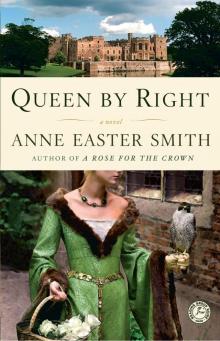 Queen By Right
Queen By Right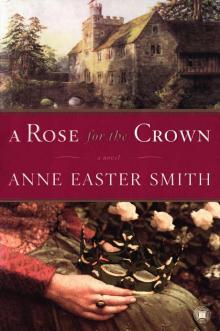 A Rose for the Crown: A Novel
A Rose for the Crown: A Novel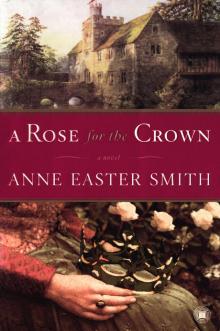 A Rose for the Crown
A Rose for the Crown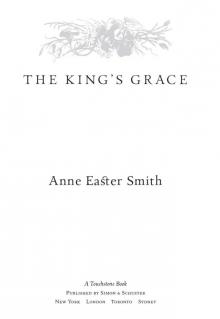 The King's Grace
The King's Grace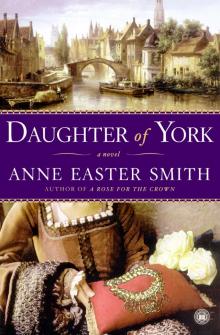 Daughter of York
Daughter of York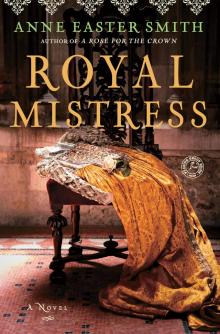 Royal Mistress
Royal Mistress